#a streetcar named desire? the glass menagerie?
Explore tagged Tumblr posts
Text
Amazing plays from lis bts. Rachel as a teenager in 2010 being absorbed in plays from the early 1900s, is such a dreamy-Cali-kid thing. "Full of imagination", as Chloe says.

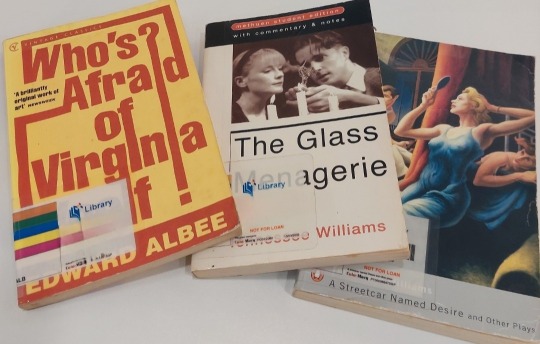
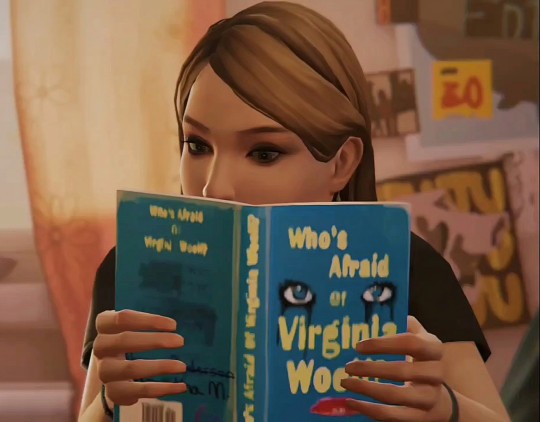
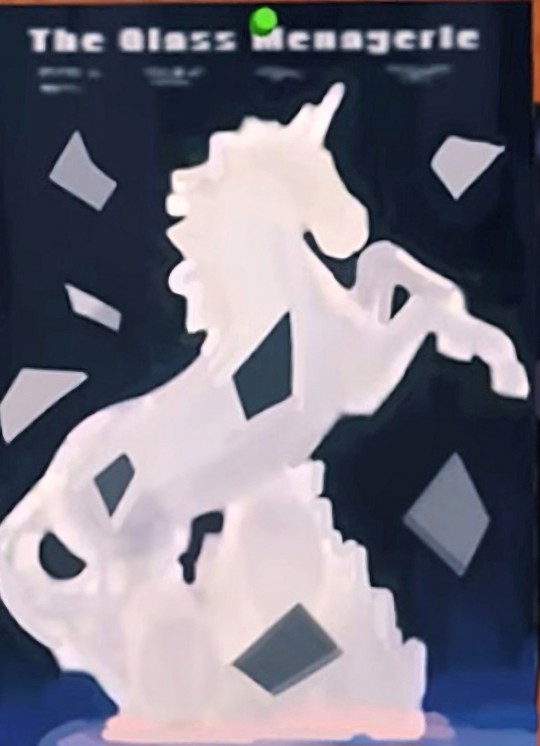
Rachel "delving into the mind of Chloe Price" by reading the book Chloe liked while she waited for Chloe to dye her hair.
Oh Chloe you'll realise Rachel's such a big fan of Tennessee Williams & Shakespeare, she even hangs posters of their plays in her room.
Kiss Me Kate inspired from Shakespeare's The Taming of the Shrew. Some of these giving me 🏳️🌈 vibes
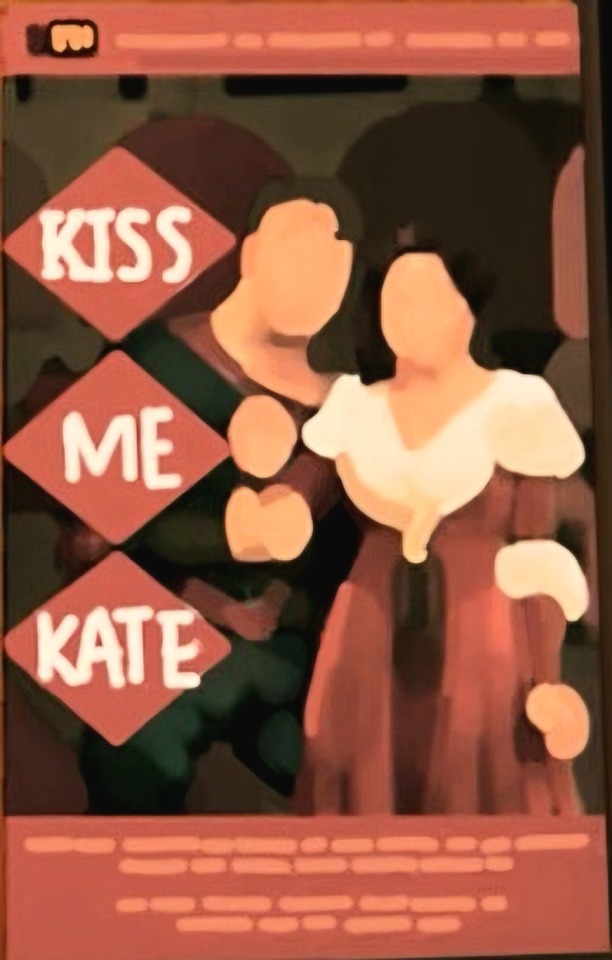
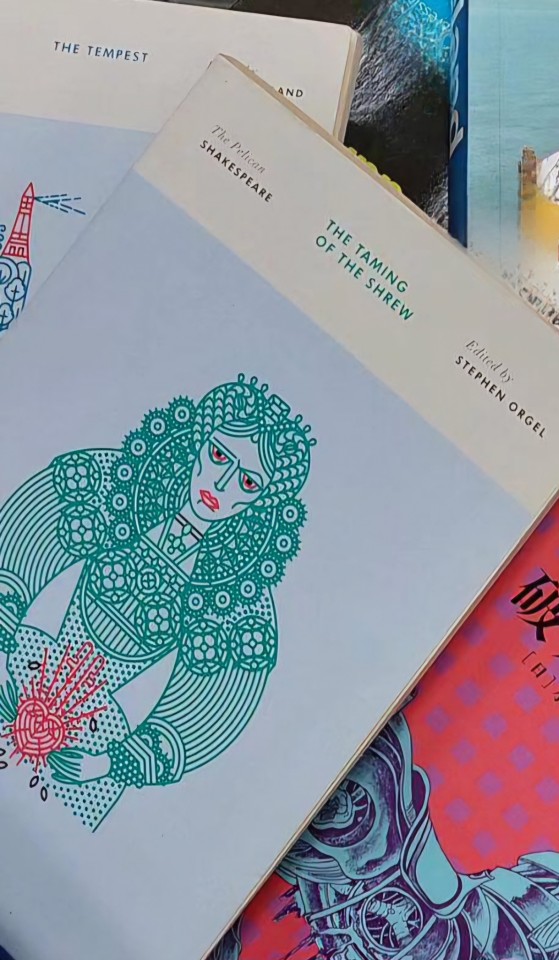
Blanche fits Rachel like a shirt. Imagine her own heartbreaking take on it.

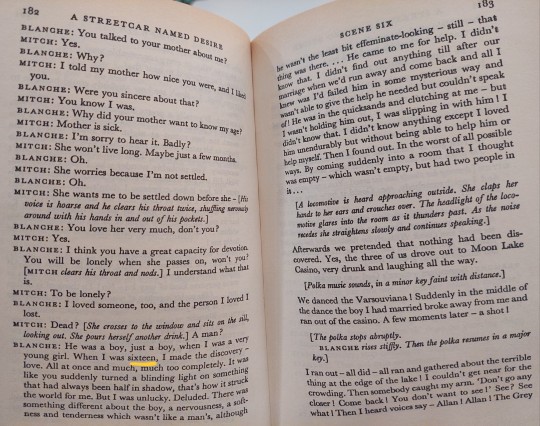
Reading book "recs" from a fandom is such an experience
More to come!
#rachel amber#life is strange#lis bts#life is strange before the storm#lis: bts#plays#tennessee williams#william shakespere#a streetcar named desire#the glass menagerie#amberprice#whos afraid of virginia woolf#drama#theatre#chloe price#lis#rachel amber 4ever#lgbtq+#lgbtq#rachel amber character analysis#rachel dawn amber#dreamy#奇异人生#瑞秋安珀#theatre poster#theatre play#lifeisstrange#lis before the storm#rachelamber#life is strange rachel
80 notes
·
View notes
Text

Tennessee Williams was renowned for his contributions to the theater world. Some of his plays include famous works such as Cat on a Hot Tin Roof, A Streetcar Named Desire, and The Glass Menagerie. Williams, who was openly gay, often featured gay characters and themes, and other topics considered taboo at the time. Despite this, his plays were generally well-received by both critics and the public. Frank Merlo was a working-class Italian American from New Jersey. He worked as an actor on occasion but was primarily Williams’ personal assistant. The two men met in 1948 at Atlantic House, a bar in Provincetown, Massachusetts. Williams describes the first time he saw Merlo in his Memoirs, “… he leaned smoking against the porch railing and he was wearing Levis and I looked and looked at him. My continual and intense scrutiny must have burned through his shoulders, for after a while he turned toward me and grinned,” (p.133). This encounter resulted in a relationship that ran the course of 15 years. In 1951, he even went on to write a play inspired by Merlo, The Rose Tattoo, which was his “love-play” to the world. It even has a dedication that reads “To Frankie in Return for Sicily.” According to his memoirs, for Williams, living with Merlo in his Manhattan apartment and in his house in Key West were some of his happiest and most productive years. But Williams was heavily involved with alcohol and various drugs. This, combined with Williams’ promiscuity, put a strain on their relationship and Williams’ writing. Then, in 1962, Merlo was diagnosed with lung cancer. As his health declined, Williams remained by his side and housed Merlo in his Manhattan apartment. Later, the cancer was deemed inoperable, and Merlo died in 1963. His last words to Williams were, “I’m used to you now,” which Williams accepted as an admission of Merlo’s love. Many consider The Night of the Iguana to be the last successful play he wrote, which premiered on Broadway in 1961. He fell into a period of depression and increased drug use following Merlo’s death and was never able to regain the success he had experienced earlier in his career. Williams himself attributed the subsequent failures to the death of Frank Merlo. On February 25, 1983, Williams was found dead at the age of 71. (x)





#tennessee williams#history#gay history#lgbt history#lgbtq history#gay#mlm#vintage men#lgbt#lgbtq#lgbtqia
20 notes
·
View notes
Text
July 2023 reading
Books:
Melissa Gira Grant, Playing The Whore: The Work Of Sex Work
Gustave Flaubert, Madame Bovary tr. Eleanor Marx-Aveling
John Lahr, Mad Pilgrimage of the Flesh: Tennessee Williams
Gabriel García Márquez, One Hundred Years of Solitude tr. Gregory Rabassa
Sayaka Murata, Earthlings tr. Ginny Tapley Takemori
John Rieder, Colonialism and the Emergence of Science Fiction
Tennessee Williams, Cat on a Hot Tin Roof
Tennessee Williams, The Glass Menagerie
Tennessee Williams, Memoirs
Tennessee Williams, A Streetcar Named Desire
Tennessee Williams, Suddenly Last Summer
Essays:
Paul Kincaid, On the Origins of Genre
Articles:
Alex Barasch, After "Barbie," Mattel Is Raiding Its Entire Toybox
Max Fox, Free the Children
Deepa Kumar, Imperialist Feminism
Terry Nguyen, The Diversity Elevator - On R.F. Kuang's Yellowface
Mandy Shunnarah, Olives, Climate Change, and Zionism
Ben Taub, The Titan Submersible Was "An Accident Waiting to Happen"
Short stories:
Sayaka Murata, A Clean Marriage tr. Ginny Tapley Takemori
Other:
Max Graves, What Happens Next
#reading#really short on essays/articles this month sorry gang. i spent 100% of my laptop time reading umineko
89 notes
·
View notes
Text
Favourite discoveries of 2024
As promised, albeit late, here's the post compiling my favourite art, entertainment, etc. that was new (to me) this year. It was an amazing year for reading and learning, here's to 2025 keeping it up 🥂



And oh my God, you are heaven-sent / With your dirty mind, yeah, you're perverted
I. Music albums: O My Heart by Mother Mother, Ta-Dah by Scissor Sisters, The Rise and Fall of a Midwest Princess by Chappell Roan, Ceremonials by Florence + the Machine.
This year marked a more concerted venture into popular music. The theme seems to be 'catchy yet intelligent', though I also love the darker-sounding, more conceptual Ceremonials. I've also been increasingly loving music from the 70s, 80s, and 90s, especially Talking Heads. Tracks that stand out: 'Rasputin' by Boney M., '[Nothing But] Flowers' by Talking Heads, 'Once in a Lifetime' by Talking Heads, 'Hip To Be Square' by Huey Lewis & the News.



You see control can never be a means to any practical end... It can never be a means to anything but more control... Like junk...
II. Novels (and one anti-novel):
Naked Lunch by William S. Burroughs, Kindred by Octavia Butler, Humiliated and Insulted by Fedor Dostoevsy, The Catcher in the Rye by J. D. Salinger, Piranesi by Susanna Clarke, Solaris by Stanisław Lem, Midnight's Children by Salman Rushdie
I've already gushed about 2024 being my reading comeback. Aside from the favourites mentioned above, I also read some more books that I might post more in-depth about at some later date. There's something unparalleled about the experience of finishing Midnight's Children and going to sleep with my head swirling with images from the book, but Naked Lunch is probably the best prose fiction I read this year, and also the most different.



Whoever you are—I have always depended on the kindness of strangers.
III. Plays: A Streetcar Named Desire by Tennessee Williams, The Glass Menagerie by Tennessee Williams, Caligula by Albert Camus, A Doll's House by Henrik Ibsen, Miss Julie by August Strindberg, The Seagull by Anton Chekhov, Vassa Zheleznova by Maxim Gorky, All My Sons by Arthur Miller, Death of a Salesman by Arthur Miller
I had to take a class on dramatic literature this year, and it was so cool getting to dissect and analyse the texts in class. Caligula was the one play I read exclusively for myself, and it was genuinely so earth-shattering the only thing I can say is that I'm living in year 1 P.R.C. (Post Reading Caligula). On the other hand, out of the assigned playwrights Tennessee Williams was by far my favourite. I fell in love with his writing and his person, and I also wrote an essay and gave a presentation on his work that I'm still very very proud of.

For about fifteen seconds there, we were actually playing tennis. And we understod each other completely.
IV. Films: Challengers (2024), Kill the Jockey (2024), Kinds of Kindness (2024), All About my Mother (1999)
It was a sparse year for films, but I'm actually shocked by how many movies from 2024 I enjoyed. Challengers was hands down my favourite. I really like where cinematography seems to be going right now, and I can finally say I loved a Guadagnino film. Kill the Jockey might be the lesser known film due to its country of origin, so I want to take this chance to highly recommend it if you enjoy slightly surreal queer stories.

I… I… I am Franziska von Karma. Don't think I'm going to walk in your shadow forever… Our battle… begins now… so you had better prepare yourself, Miles Edgeworth!
V. Game of the year: Phoenix Wright: Ace Attorney (no contest)
It was a shock to me to get so into the original AA trilogy, but I truly fell in love with each and every member (biological or otherwise) of the von Karma family; whatever they have going on compels me insanely. I think Manfred's enduring presence throughout the games is one of the most fascinating things about it, and it's so well-written in that regard. I really hope I can do it justice in my posts. I highly recommend this franchise if you enjoy dysfunctional families, trauma, and the phrase "haunting the narrative".

I truly hope this was of some interest; I'm very willing to go on about these things further lol. Thank you for reading and hopefully I'll be making another post like this at the end of the year!
6 notes
·
View notes
Text

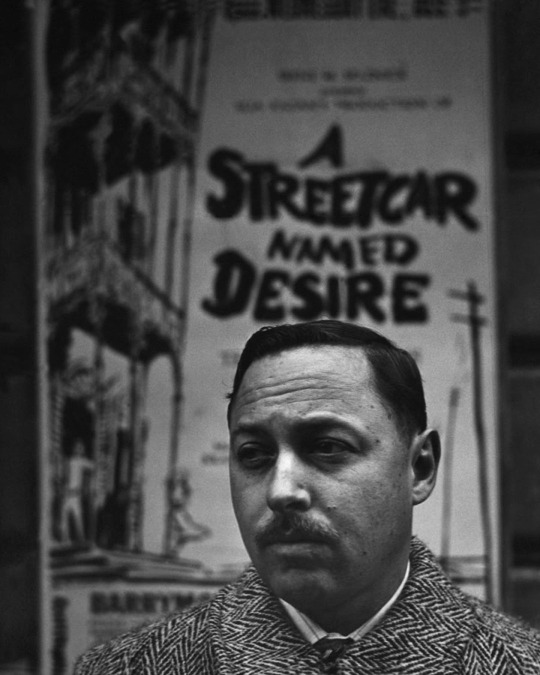

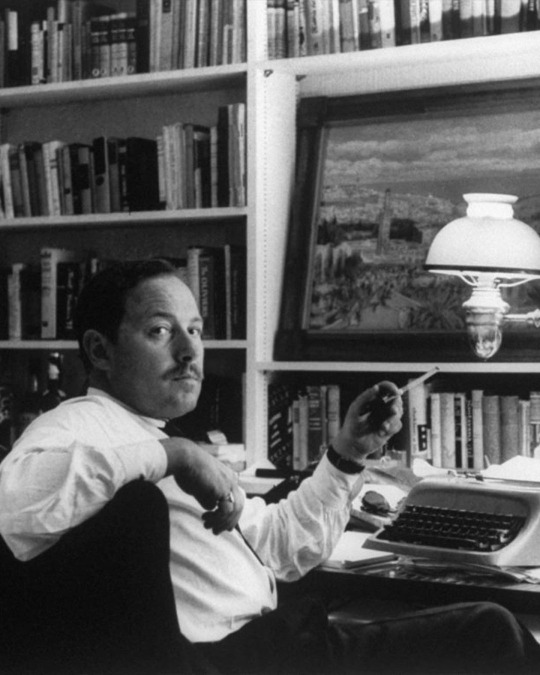

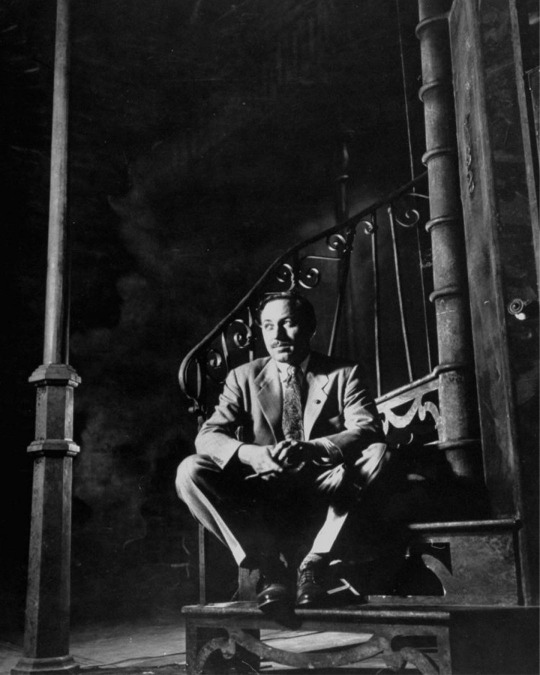
Today, we celebrate the life and legacy of one of the most influential playwrights of the 20th century, Tennessee Williams. Born on March 26, 1911, Williams gifted the world with timeless works of art that continue to captivate audiences worldwide.
Beyond his unparalleled talent for crafting compelling narratives and complex characters, Tennessee Williams was also a trailblazer in openly discussing and portraying themes of sexuality. As a bisexual man, Williams fearlessly explored the intricacies of human desire and identity in his plays, challenging societal norms and advocating for greater acceptance and understanding.
Through iconic works such as “A Streetcar Named Desire,” “Cat on a Hot Tin Roof,” and ”The Glass Menagerie,” Williams delved into the depths of human emotion, exposing the raw and often tumultuous nature of relationships, both romantic and familial. His willingness to confront taboo subjects, including bisexuality, paved the way for greater representation and diversity in the arts.
Today, we honor Tennessee Williams not only for his unparalleled contributions to the world of theater but also for his courage in embracing his own identity and shedding light on the multifaceted spectrum of human sexuality. Let us continue to celebrate his enduring legacy and strive to foster a world that embraces love, acceptance, and artistic expression without boundaries.
✏️
https://bi.org/en/articles/famous-bis-tennessee-williams
#lgbt#queer#bisexuality#bi#lgbtq#lgbtqia#bi pride#bi visibility#bivisibility#representationmatters#tennessee williams#a streetcar named desire#playwright#writers on tumblr#writer#iconic#cat on a hot tin roof#bisexual men#bisexual#bi men#bi man#bi culture#lgbt icons#lgbt pride
11 notes
·
View notes
Text
Plastic Theatre In Prose: Aşk-ı Memnu
For a while I’ve really enjoyed reading what I can only describe as ‘Plastic Theatre’, not simply in plays, but in prose.
Plastic Theatre is known as a technique used by 20th century dramatist Tennessee Williams, known for A Streetcar Named Desire, The Glass Menagerie and Cat on a Hot Tin Roof among other plays (these three that I have read/seen are excellent). It involves a symbolism that borders on the surreal and a heavy awareness of the spaces that characters operate in as representative of their inner states or relationships. If the curtains are blue, there’s a very good reason.
I haven’t, however, been able to find any criticism that makes the jump from Williams’ on-stage Plastic Theatre to its mirrors in prose. (If anyone knows of any, please direct me to it)
Margaret Atwood is the author who I saw it in first. She is an incredibly deliberate author, playing with language constantly, and so, of course, when she describes a space, she does not do so without good reason. The constant and intoxicating symbolism of The Handmaid’s Tale may be forgotten sometimes in favour of its high-concept, but one must note that the actual plot of the novel is very limited (just as our narrator is very limited). It is the prose, the linguistic entanglements and the imagery of flowers, of eggs, of corpses, that sustains engagement and creates such a powerful and meaningful story.
Angela Carter’s The Bloody Chamber (which I have some issues with, plot-wise) is linguistically and symbolically incredibly rich. Where I was tired by the constant returns to that (I don’t want to talk about it; if you know, you know) as apparently the only means of darkening a fairy tale, my interest was maintained by the cleverness of the prose and the richness of the text. As with Atwood, every detail has a secondary meaning or a hundred secondary meanings.
Halit Ziya Uşaklıgil’s Aşk-ı Memnu seems also to have an element of plastic theatre in its construction, gesturing not only to symbols of space, dress and action but also to genre. Plastic theatre in Aşk-ı Memnu is not so sustained as in the works of modern writers, but equally it is more sustained and intrusive onto naturalism than its contemporaries.
Firstly, Halit Ziya is luxuriously heavy-handed in the names he gives his characters; even in the text, he cannot help but inform us that ‘through a strange irony she was taller and more slender than her name’, a playful hint not at all distant from Williams’ Blanche dissecting her own name so falsely in A Streetcar Named Desire. Beşir, bringer of good news or prophet, seems almost to give the game away before he has begun.
Yet Halit Ziya does give the game away before he has begun. Forbidden Love and the immediate rendition of Firdevs’ history sets up Bihter’s fall from the very beginning and, like all adulterous women in such novels, her death feels inevitable (I am feeling very tempted to write another post about the agency dynamics of why these women must, narratively, at least, end in disaster). There are few narrative surprises in Aşk-ı Memnu. What is there in abundance, however, is linguistic and symbolic art.
I will only consider the first chapter in detail, but to do so will require much ranging across the text regardless.
From the first chapter, Halit Ziya puts perhaps excessive emphasis on the colours around the Melih Bey set, ‘Melih’ alluding to charm and beauty, the white of Bihter’s veil and the white of their boat against the mahogany of Adnan Bey’s— the innocence of Bihter and the stately rigidity of grief that her marriage to Adnan Bey will bring— and Firdevs’ wish to erase the whiteness of her own hair to prevent the returned innocence and what she perceives as the neutered sexuality of old age.
When ‘[Firdevs’] husband’s name was erased’, this is reflected in the narrative by the literal absence of him or his name. He is subsumed into Firdevs’ in the same way Nihal’s mother is into Adnan and part of Adnan and Bihter’s conflict is perhaps that neither can swallow the other into their world entirely until Bihter is dead.
The scenes between Firdevs and her husband are incredibly rich. The letter in the bouquet not only foreshadows Firdevs’ letter to Behlül, but also renders an image of Firdevs’ nature: a beautiful exterior which conceals an interior of unknown substance. Halit Ziya is a writer; he treats word and narrative as powerful (see the semantic field of literature, narrative and the physical object of the book when Behlül discusses his romantic feelings). No matter how grotesque Firdevs’ external pursuit of beauty becomes, she is notable for having the power of word and falling into the trap of its becoming revelation. She keeps her love letters in the yonic drawers and her husband savagely destroys in what can be read as an attempt to wrest back the masculinity that was lost in the erasure of his name, but when he is dead, Firdevs reasserts herself as masculine in power. She will hunt for a yonic ‘purse’, predatory, though unsuccessful.
The dynamic between public spaces and private spaces is also masterfully utilised. It is in the semi-public space of the river and the boats that Adnan Bey and Bihter’s relationship is born, but it is also there that Firdevs is first revealed to her husband. Forests also function in a similar way— a space where social convention is briefly confused, as in Chapter Seven’s picnic and Chapter Nineteen’s magical forest, oozing with the mutability of a Shakespearian or folkloric forest.
Outside, the narrative concerns itself with fashion, with known histories, with reputation and with mere flirtation, but when Nihat Bey brings the women inside, into their private sphere, the narrative immediately switches to domesticity and marriage. Where the externally focused Firdevs had managed to dominate the novel’s opening, now the internal world belongs to Bihter.
The more the narrator retreats, with Bihter, from the outside world, to the interior of the house, to her own small room, the more aware of her interior thoughts we become and the more tightly she seems to be bound by circumstance.
The early imagined ‘rainbow [...] deluges of green, blue, yellow and crimson, [...] sunshine composed of emeralds, rubies, diamonds and turquoises were being poured’ seems to signify a point of multiple paths, but also becomes the world of her relationship with Adnan. Like Stanley and Stella’s coloured lights in Streetcar, colour becomes dualistic in Chapter Eight, the luxury of jewels and silks becoming the oppressive greens, blues, yellows, and reds flowed over the shadows, creating and destroying each other. These colours of experience, pulling her from her initial ties with white, will once then again morph in to become an emblem not of Bihter and Adnan Bey’s relationship, but of her independence. Reconfigured, Chapter One’s rainbow is now representative of Bihter’s escape from Firdevs, just as Chapter Eight’s is her escape from Adnan into the arms of whatever love she can grasp, be it from herself, or later from Behlül.
Note also that the main item of jewellery Bihter will eventually receive is emerald green as Halit Ziya employs literary shorthand to emphasise Nihal’s envy.
The final confrontation of this chapter takes place on the şehnişin, a space neither inside nor outside, private nor public. Firdevs is most comfortable in the public arena, she wishes to draw Bihter outside, at least partially; it is in this space that Bihter assumes a ‘demeanour peculiar to children’, emphasising her own initially liminal state between childhood and womanhood. It is a ‘dark night’, yet through ‘half-closed eyes’, Bihter watches ‘a speck of light’. Halit Ziya refuses to allow the pair to exist certainly in any capacity.
Even in a single chapter, so many symbols and generic references are invoked. Later, Nihal will repeatedly signal the gothic and the folkloric without the narrative ever truly becoming either of these; Mlle Courton, in Chapter Three incessantly invokes the French sensibility tradition, yet this too, cannot overtake the narrative. Behlül persists in his romance. Yet, in death, Bihter reclaims the genre of the book for her own, enforces her own story. Nihal can try to evade it, try to pretend that she is the heroine who survived the wicked stepmother and her wicked prince, but Bihter’s stamp on the novel cannot be erased. She could not swallow Adnan Bey into the Melih Bey set, but she could swallow his narrative into her genre: the domestic drama wins out.
(I feel like I have to make a little addendum because this is a Tumblr post and not an academic essay; I write with excessive confidence as a stylistic choice. Every single point made here is up for debate.)
#Aşk-ı Memnu#plastic theatre#tennessee williams#margaret atwood#angela carter#halit ziya uşaklıgil#the handmaid's tale#the bloody chamber#a streetcar named desire#symbolism#lit crit
36 notes
·
View notes
Text
Continuing Literary Canon
100. Federico Garcia Lorca, Blood Wedding
101. Jean-Paul Sartre, No Exit
102. Albert Camus, The Stranger
103. Eugene Ionesco, The Bald Soprano
104. William Butler Yeats
105. George Bernard Shaw, Pygmalion
106. Thomas Hardy, The Return of the Native
107. Joseph Conrad
108. D.H. Lawrence
109. Virginia Woolf
110. James Joyce
111. Samuel Beckett, Waiting for Godot
112. Aldous Huxley, Brave New World
113. W. H. Auden
114. George Orwell, 1984
115. Franz Kafka - Metamorphosis
116. The Trial
117. Bertolt Brecht, Mother Courage
118. Thomas Mann
119. Andrei Bely, Petersburg
120. Mikhail Bulgakov, The Master and Margarita
121. Boris Pasternak, Dr. Zhivago
122. Edwin Arlington Robinson
123. Robert Frost
124. Edith Wharton
125. Willa Cather
126. Gertrude Stein
127. Wallace Stevens, "Sunday Morning"
128. Theodore Dreiser, Sister Carrie
129. Sherwood Anderson
130. T.S. Eliot - "The Love Song of J. Alfred Prufrock"
131. "The Waste Land"
132. "The Hollow Men"
133. "The Journey of the Magi"
134. Katherine Anne Porter
135. Eugene O'Neill, Long Day's Journey into Night
136. F. Scott Fitzgerald, The Great Gatsby
137. William Faulkner - The Sound and the Fury
138. Ernest Hemingway -The Old Man and the Sea
139. A Farewell to Arms
140. John Steinbeck, The Grapes of Wrath
141. Zora Neale Hurston, Their Eyes Were Watching God
142. Eudora Welty
143. Flannery O'Connor
144. Vladimir Nabokov, Lolita
145. J. D. Salinger, The Catcher in the Rye
146. Tennessee Williams - A Streetcar Named Desire
147. The Glass Menagerie
148. Arthur Miller, Death of a Salesman
149. Toni Morrison, Song of Solomon
150. Joyce Carol Oates
151. Philip Roth, Portnoy's Complaint
152. John Updike - A&P
153. The Witches of Eastwick
3 notes
·
View notes
Note
Just throwing out all of the ones I can think of off the top of my head for suggestions: By the Skin of Our Teeth, After Juliet, How to Kill a Mockingbird, A Streetcar Named Desire, Hamlet, Macbeth, The Glass Menagerie, Twelfth Night, A Midsummer Night's Dream, Romeo and Juliet, Death of a Salesman, Proof, Topdog/Undedog, A Raisin in the Sun. Might come back with more later. Please let us know if you would prefer asks that don't have a bunch of submissions together or if this is okay.
all in the queue!! either way of submitting is fine :]
2 notes
·
View notes
Text
22 books (went through a massive slump though so the majority of these are from October onwards)
I only reread some of the books for my english literature course to annotate and revise. So that would be the Picture of Dorian Gray by Oscar Wilde and Dracula by Bram Stoker
After Sappho by Selby Wynn Schwartz, the Bell Jar by Sylvia Plath, Good Omens by Neil Gaiman and Terry Pratchett, Half of a Yellow Sun by Chimamanda Ngozie Adichie (also honourable mention to Purple Hibiscus by the same author), and the Handmaid's Tale by Margaret Atwood
Chimamanda Ngozie Adichie is definitely a top author for this year, as well as other authors I hadn't read from like Sylvia Plath, Selby Wynn Schwartz, and Andrea Lawlor
I read a lot of Gothic, mainly for my studies hut eventually just for pleasure. Top books from the genre are probably Carmilla by Shetidan Le Fanu and Roarings From Further Out by Algernon Blackwood
Pachinko by Min Jin Lee, Little Women by Louisa May Alcott, the Phantom of the Opera by Gaston Leroux, and Rebecca by Daphne de Maurier
I don't actually use Goodreads but I use Bookmory, and my average rating is 3.8 stars, which seems accurate since I've normally either loved or hated the books I've read
I only aimed to read 20 books this year and to read more gothic which I did both of :)
I started reading gothic, plus I have also gotten into more books outside my usual genres but I couldn't tell you which genres they were
I've only read one book released this year, which is Trick Shot by Kayla Grosse (it's just smut lol)
Probably all of my favourites from this year again haha
The Female Man by Joanna Russ is an alright book but I'm struggling to understand any of it since the perspective is rarely explained so I sometimes have no idea who is talking
Dracula was horribly written and analysing it made me want to die, same for Glass Menagerie and a Streetcar Named Desire both by Tennessee Williams
I'm about midway through the Female Man at the moment so I'm hoping that I can get it finished by the end of the year but I'm not too sure how likely that is
The books by Chimamanda Ngozie Adichie won awards when they came out but that's around 20 years ago, I've not really read any recent books
Dracula again, I have no clue how this set the tone for vampire content when you only see vampires like five times throughout the whole novel
I had heard that Purple Hibiscus was boring and hard to get through but I haven't enjoyed a book that much in a long time - to the point where I was practically jumping out of my seat at parts
I'm too ashamed to keep track of my spendings on books haha. Probably a lot more than I've read though
No, I have to take the bus to get to my closest library and I'm really enjoying building up my own library at home
I've not actually kept track of any authors this year, normally I would read any Sarah J Maas book that comes out but I can't really be bothered with her new series yet
No, but me and my friend absolutely adore talking shit on books we hate and opinions people have online that we disagree with
Half of a Yellow Sun was 433 pages, I mainly read shorter stories this year
I managed to finish Carmilla in 1hr 56mins, though it was a lesbian vampire so can you really blame me
No! I actually managed to go a year finishing all books I started!
I'm probably going to aim for 30 books because I'll be reading more the first half of the year but I'll have exams plus I'm moving away to uni in the second half of the year so I'll probably be focusing on other things
end-of-year book ask
How many books did you read this year?
Did you reread anything? What?
What were your top five books of the year?
Did you discover any new authors that you love this year?
What genre did you read the most of?
Was there anything you meant to read, but never got to?
What was your average Goodreads rating? Does it seem accurate?
Did you meet any of your reading goals? Which ones?
Did you get into any new genres?
What was your favorite new release of the year?
What was your favorite book that has been out for a while, but you just now read?
Any books that disappointed you?
What were your least favorite books of the year?
What books do you want to finish before the year is over?
Did you read any books that were nominated for or won awards this year (Booker, Women’s Prize, National Book Award, Pulitzer, Hugo, etc.)? What did you think of them?
What is the most over-hyped book you read this year?
Did any books surprise you with how good they were?
How many books did you buy?
Did you use your library?
What was your most anticipated release? Did it meet your expectations?
Did you participate in or watch any booklr, booktube, or book twitter drama?
What’s the longest book you read?
What’s the fastest time it took you to read a book?
Did you DNF anything? Why?
What reading goals do you have for next year?
#im sorry i know i repeatedly mentioned the same authors i just love them so much i could help it#reading
17K notes
·
View notes
Text
Exclusive Interview: Director Joe Bailey of UofD Mercy's 'The Glass Menagerie'
You might not have heard the name Tennessee Williams, depending on how deep you are into the theatre scene, although you probably are familiar with his work. The prolific playwright and screenwriter has created some of the most recognizable plays throughout his career. A Streetcar Named Desire and Cat on a Hot Tin Roof might be two that most people can name, but it’s his play, The Glass…
#Michigan#detroit#theatre#glass menagerie#the glass menagerie#tennessee williams#directing#director#stage play#university of detroit mercy
0 notes
Text









Theatre: My first time seeing A Streetcar Named Desire. It seems perfect timing as we will be back in New Orleans in nineteen days. I have read it and have seen the old B&W movie with Marlon Brando. We took in The Glass Menagerie at the Duke of York Theatre in London a few years ago.
0 notes
Text
A Shattering Portrait of Family Dynamics: "A Glass Menagerie" at San Francisco Playhouse
Tennessee Williams' iconic masterpiece, "A Glass Menagerie," has been mesmerizing audiences for over 75 years, and the current production at San Francisco Playhouse is a poignant reminder of its enduring power. This memory play, Williams' first major success, premiered in 1944 and catapulted the playwright to fame.
Tennessee Williams (1911-1983) was a titan of American theatre, known for his poetic and emotionally charged works that probed the human condition. His plays often explored the complexities of family relationships, desire, and the American South. Some of his notable works include "A Streetcar Named Desire," "Cat on a Hot Tin Roof," and "The Night of the Iguana."
"A Glass Menagerie" is a semi-autobiographical work, drawing from Williams' own experiences growing up in St. Louis with his mother, Amanda, and his sister, Rose. The play revolves around the Wingfield family, struggling to come to terms with their past and present. Amanda (Susi Damilano), a former Southern belle, clings to memories of her youth, while her children, Tom (Jomar Tagatac) and Laura (Nicole Javier), grapple with their own disillusionments. The arrival of Jim O'Connor (William Thomas Hodgson), a charming but unattainable suitor, sets off a chain reaction of emotions that exposes the family's fragility.
The cast delivers standout performances, with Susi Damilano shining as the formidable Amanda. Her portrayal is both fierce and vulnerable, capturing the character's desperation and wit. Jomar Tagatac brings a quiet intensity to Tom, conveying the character's inner turmoil and longing. Nicole Javier's Laura is heartbreakingly fragile, her movements and mannerisms perfectly capturing the character's shy and crippled nature. William Thomas Hodgson's Jim O'Connor exudes charm and empathy, making his character's impact on the family all the more poignant.
Director Jeffrey Lo’s vision is nuanced and thoughtful, balancing the play's humor and pathos. The set design, a beautiful and delicate glass menagerie, serves as a powerful symbol of the family's fragility and beauty.
San Francisco Playhouse's production of "A Glass Menagerie" is a stunning rendition of a timeless classic. With its exceptional cast, thoughtful direction, and evocative design, this play is a must-see for anyone who loves theatre. Tennessee Williams' masterpiece continues to captivate audiences, and this production is a testament to its enduring power.
Runtime: 2 hours 30 minutes, including one 15-minute intermission
Venue: San Francisco Playhouse, 450 Post Street, San Francisco, CA 94102
Dates: 5/19-6/15, 2024
Tickets: $15-75 available at www.sfplayhouse.org



#tenessewilliams glassmenagerie aglassmenagerie Sfplayhouse Sfthtrs sanfrancisco broadwayplay sftheatre theatresf#Spotify
0 notes
Text
at AS level we had to write an extended scene from the glass menagerie of all things... i think i ended up implying a crossover with streetcar named desire.
"I know your school didn't teach you how to write fanfic-" I know this is something said in response to Americans whining about their education system in response to racism, but my school English class actually did have us write an epilogue to a book we were reading as an assignment, so in a way my school did teach me how to write fanfic. I have no point to make with this point and I don't care to i just wanted to share a tidbit about my life
8K notes
·
View notes
Note
Where do I start with Tennessee Williams?
the glass menagerie or a streetcar named desire, imo. i think menagerie lays out the beats for the kind of discourse you can expect from williams very straightforwardly; it's also one of his earliest works and his first major hit, so it's a good one to start with if you want to see what groundwork it lays for his later writing. streetcar is emblematic of williams at his best. after that, i would say cat on a hot tin roof, suddenly last summer, and summer and smoke are all solid choices.
39 notes
·
View notes
Note
12 and/or 4 for the book asks, if you didn't get them already
4. Did you discover any new authors that you love this year?
The crowning jewel of 2024 is I fear Tennessee Williams. It was love at first sight with The Glass Menagerie, and I also fell hard for him as a person. Something about the way he wrote just gave me the deep impression that he was a very kind man, somehow. I chose to read A Streetcar Named Desire and write about sexuality, power dynamics, and the gender binary in both plays for my final assignment, and ngl I teared up at several points. I NEED to read his short stories.
Aside from him, Octavia Butler was an unexpected but staggering discovery, and William Burroughs was a similarly staggering but more expected one.
12. Any books that disappointed you?
Hesse's Demian. I found its thesis heavy-handed and not really that interesting, and the character's voice wasn't nearly distinctive enough to make up for it. I'm not sorry I read it, and I didn't have a bad time reading it, but I certainly expected more.
1 note
·
View note
Text
History
March 26
March 26, 1979 - The Camp David Accord ended 30 years of warfare between Israel and Egypt. Prime Minster Menachem Begin of Israel and Egyptian President Anwar Sadat signed the treaty of mutual recognition and peace, fostered by U.S. President Jimmy Carter.
March 26, 1992 - Soviet Cosmonaut Serge Krikalev returned to a new country (Russia) after spending 313 days on board the Mir Space Station. During his stay in space, the Soviet Union (USSR) collapsed and became the Commonwealth of Independent States.
Birthday - American playwright Tennessee Williams (1911-1983) was born in Columbus, Mississippi. His works featured Southern settings and include; The Glass Menagerie, Night of the Iguana, and two Pulitzer Prize winning plays, A Streetcar Named Desire and Cat on a Hot Tin Roof .
0 notes